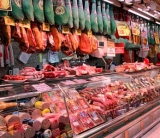How to open a butcher shop
 Meat is the product without which many simply do not represent their diet. Almost everyone eats meat (those who have special convictions about this, do not take into account – their minority), because it is nutritious, useful and just very tasty! Meat is sold everywhere — in small convenience stores, in supermarkets, in organized or spontaneous markets, even in kiosks on the subway.
Meat is the product without which many simply do not represent their diet. Almost everyone eats meat (those who have special convictions about this, do not take into account – their minority), because it is nutritious, useful and just very tasty! Meat is sold everywhere — in small convenience stores, in supermarkets, in organized or spontaneous markets, even in kiosks on the subway.
But the most, so to speak, respected places of purchase of meat remain specialized meat shops. Buyers have much more confidence in just such outlets, because if the store fully specializes in meat, then the chances that the product there is always high-quality and fresh is much more. Today we will talk about how to open a butcher shop and do business on the human need for this indispensable product.
Butcher Shop Business Plan
A well-made business plan for a butcher shop is very important in this business. Butcher’s shop has its own characteristics and nuances, therefore it is impossible to equate it even with stores of a different orientation. Here you can download a free sample business plan of a butcher shop, and use it as a basis for drawing up your business plan.
How to open a meat shop
“What do you need to open a butcher shop?” – This is the question that you ask yourself first. In fact, the necessary stages of opening such a shop are not so much, the main thing is to do everything consistently and with the mind.
Where to open a butcher shop?
Butchery, like any other, is very important number of buyers. To increase this figure to the maximum, place your shop where theoretically the largest number of potential customers will pass. This is one of the fundamental laws for locating any outlet, and the butcher’s shop is no exception. You can open the meat shop in one of the following options:
1. Detached building. It can be a small stand-alone store built from metal structures. In appearance, these stores resemble “extended kiosks.” The only difference is that the space of the premises will be larger by several square meters and the building will have a separate entrance, as the store relies, and not just a window. You can place such a shop near the popular supermarket, market or kiosks.
2. The room on the first floor of the house. With this option, you do not have to build anything. It is only necessary to find a territory for rent on the first floor of a residential building (do not forget about the transfer of the premises to the status of non-residential fund). Choose a room in densely populated areas, and it is desirable that the entrance to the store is from the side of the roadway. If the store is located somewhere deep in the courtyards, then only residents of the houses adjacent to it will know about it. And you will obviously not enough of them.
3. Trading area in the supermarket. This option is probably the most promising. Large supermarkets, especially if they are already in good demand among buyers, will play you an excellent service – you will not have to puzzle over how to attract customers, because there is a dense stream of people there every day.
What size area is needed?
Given the fact that the rental of the premises is now quite high, you can easily open a butcher shop in a small commercial area. For example, you may well have 10 square meters to accommodate even an extensive range of goods. If you managed to get a larger area than you thought, then let the “extra” territory not remain idle – fill it with other goods. For example, sausage products, dairy products, bakery products, juices, etc.
The total area should be divided into a commercial zone, a zone for the preparation of semi-finished products and a zone for cutting meat. Naturally, all this should not be done in the same room.
What documentation needs to be issued?
First you need to register yourself as an entrepreneur. For the sale of food at one outlet you have enough status of IP. After that you will need to approve the premises in which you are going to trade in the appropriate services. Permits will need to be obtained from the fire and sanitary-epidemiological service. Also be prepared for inspections from consumer and veterinary services. For all meat products, you should always have veterinary certificates on your hands, confirming the quality of meat and animal health. These documents must be issued by your suppliers.
For each employee who will contact with meat, there should be a sanitary book. Also do not forget to get a book of complaints and suggestions.
The owners of butcher shops say that it took them on average about two months to get all the permits.



